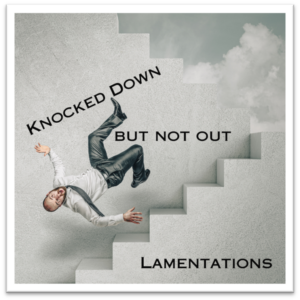
Cruising Route 66
How deserted lies the city, once so full of people! How like a widow is she, who once was great among the nations! She who was queen among the provinces has now become a slave. Bitterly she weeps at night, tears are upon her cheeks. Among all her lovers there is none to comfort her. All her friends have betrayed her; they have become her enemies.” Lamentations 1:1-2
The Judahites thought of themselves as God’s chosen people, and as such, they felt that they would always experience good things. They knew that it was God who had made a covenant of blessing with them. Unfortunately, they forgot that it was conditional.
The author of Lamentation is Jeremiah, whose book we just addressed. In that book God spoke to Jeremiah and told the people that they were destined for destruction if they didn’t turn back to Him and away from the worship of the works of their own hands. The books of 2 Kings and 2 Chronicles describe the moral decline of the kingdom of Judah in spite of the warnings that it would lead to defeat and captivity. The book of Lamentations is the fulfillment of those prophetic warnings of doom. The kingdom has fallen, the people are enslaved, and Jeremiah is left to mourn the devastation.
Webster defines lamentation as an expression of sorrow and grief, weeping or wailing over a grievous loss. It is Jeremiah despairing over the destruction of Jerusalem. I had recently seen a documentary about WWII. It contained an old film of a man walking through the rubble of a bombed-out neighborhood. He was dressed in tattered, torn clothing and moved slowly through the smoking ruins.
He seemed to be lost. Yet he knew where he was. Then he stopped, bent down, and picked something up. Standing there for a long moment, he looked heavenward and began to cry, holding the object close to his chest. He then set it gently back where he had found it and slowly moved on. He worked his way through the rubble until another object of painful memory came to his attention. There he repeated picking it up, weeping, and returning it to its place. This is Jeremiah!
It’s interesting to note that the name of the book “Lamentations,” or in the Hebrew qinot, is not the original title. In fact, its present title is more of a result of the English interpretation of the theme of the book. It was the common custom of the Jews to use the first word of the book as its title. So it was originally known as ekah, meaning “How!” or “Alas!”
How could this happen to a nation with such promise and with God’s hand upon her? What Jeremiah learned, and what we must also recognize, is that we can’t accept God’s promises without also accepting His conditions.
This is a book of poetry in which the author works his way through every grief, hurt, and fear, opening up completely to both God and man. There are six major topics, all linked to suffering, that are addressed.
First: Their suffering was the result of their sin. Jeremiah tells us in chapter 40 that even the Babylonians knew that the suffering of the Jews had not come upon them by chance.
Her foes have become her masters; her enemies are at ease. The LORD has brought her grief because of her many sins. Her children have gone into exile, captive before the foe.
Lamentations 1:5
Have you ever noticed that those who don’t even acknowledge a belief in God are the first to point out that the calamity you face may be a direct result of your actions? We don’t like the idea that God would discipline us in this way. However, it is simply God removing His hand of blessing. What’s left?
Second: Their suffering was seen as coming from God rather than man. The Babylonians were a tool in God’s hand. The fact that God was the ultimate cause is seen throughout the book.
To crush underfoot all prisoners in the land, to deny a man his rights before the Most High, to deprive a man of justice, would not the Lord see such things? Who can speak and have it happen if the Lord has not decreed it? Lamentations 3:34-37
44 verses refer to God’s involvement. God is not hiding behind the actions of men. He’s stating it clearly. “I am the righteous judge, slow to anger, but don’t mock my mercy,” God called the people to turn to Him. He sent men to warn them of the consequences of their actions. Yet they ignored Him.
Third: Their suffering, tears, and prayer belong together.
Let us examine our ways and test them and let us return to the LORD. Let us lift up our hearts and our hands to God in heaven and say: We have sinned and rebelled, and you have not forgiven. Lamentations 3:40-42
The statement “You have not forgiven” is like saying, “We have asked for forgiveness. Yet I look around, and the city is still in ruins!” Why do we believe that if we say, “I’m sorry!” God is obligated to return all the blessings and make everything as it was previously.
Judah was encouraged to pour out their hearts to God, to weep before Him, and tell Him all the details of their pain, grief, and frustration. Each chapter, except #4, ends in a prayer, and all of chapter 5 is a prayer. Each is detailed and emotional, leaving us with the understanding that this kind of prayer is expected in such circumstances.
Fourth: Their prayers were to always look for some ray of hope.
Yet this I call to mind and therefore I have hope: Because of the LORD’s great love we are not consumed, for his compassions never fail. They are new every morning; great is your faithfulness. Lamentations 3:21-23
Our hearts should never be given over completely to sorrow. In the midst of despair, we must cling to the hope we have in God’s mercies, compassion, and faithfulness. The manifestation of God’s discipline did not mean that His love had ceased or even decreased in any way. When the discipline had accomplished God’s purpose, the circumstances would change. Their future, as ours, holds vindication.
O Lord, you took up my case; you redeemed my life. Lamentations 3:58
In other words, wherever you are, no matter what you are facing, hold on to the promise that where you are is not where you are going to be.
Fifth: Their suffering could direct them toward God.
I say to myself, “The LORD is my portion; therefore I will wait for Him.” The LORD is good to those whose hope is in Him, to the one who seeks Him; it is good to wait quietly for the salvation of the LORD.” Lamentations 3:24-26
Even though the Book of Lamentations is seen as a chronicle of great, traumatic suffering and pain, there is nothing to indicate that God had totally abandoned them, or is there any sign that His principles and standards had been removed from their minds? God may have allowed their lives to be devastated on the outside, but His truth lived on the inside.
The question is, would they turn back to it?
As you read this unique book, try to put yourself in their place. Look around the world we see today. Are we exempt from God’s wrath? Have we misplaced our allegiance and devotion to our creator? Are we ready to stand in the winds of adversity to proclaim the truth of God’s word? Think about it, then pray…
Until next time…
Ben








